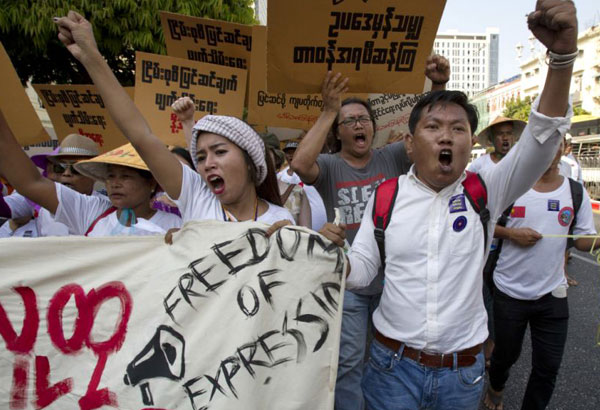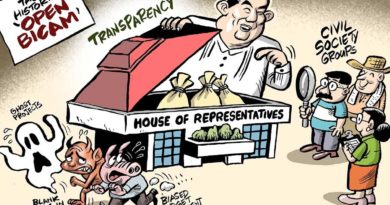POLITICS-HUMAN RIGHTS: YANGON – Protesters slam plans to toughen Myanmar public assembly law
Demonstrators shout slogans, protesting against a toughening Myanmar public assembly law in Yangon, Myanmar, Monday, March 5, 2018. About 200 demonstrators marched against the government’s plans to amend the Peaceful Assembly and Peaceful Procession Law, a law governing public protests in a manner making it easier to charge protesters with crimes while increasing the penalties for violations. (AP Photo/Thein Zaw)
YANGON — About 200 people marched in Myanmar’s biggest city on yesterday to protest government plans to amend a law governing public demonstrations to make it easier to charge participants with crimes and increase penalties for violations.
The Peaceful Assembly and Peaceful Procession Law was enacted in 2010 under a military-backed civilian government, and was welcomed at the time for legalizing activities that were suppressed under the previous military regime. Its key provision allowed street demonstrations if permission was obtained beforehand, with failure to obtain permission punishable by three to six months’ imprisonment and a fine of 30,000 kyats ($22).
The current civilian government led by Nobel Peace Prize laureate Aung San Suu Kyi’s National League for Democracy party proposed last month that a clause be added saying that “anyone who instigates, persuades others intentionally or knowingly to contradict national security, the rule of law, tranquility and public morale” can be punished by up to three years in prison and a fine.
“We are protesting today because the so-called democratic government is trying to amend the law to oppress people who want to express their opinion and to protest for their rights,” said Naw Ohn Hla, a land rights activist who participated in the protest.
The coming to power of Suu Kyi’s party in 2016 led to high hopes that a new era of democracy and freedom of speech was at hand after decades of oppression under military rule. However, although there has been substantial liberalization, the civilian government has continued policies that limit freedom of expression. At least 100 people have been charged under the Telecommunications Laws for expressing criticism of the government online and at least 33 journalists have been arrested or are facing trial.
Rights groups and civic organizations said the move by Suu Kyi’s government to change the law is another alarming restriction on freedom of expression undermining the transition to democracy.
“We believe that this proposal to amend the law is to be able to easily punish peaceful protesters, and this is against democratic values and principles,” said the Myanmar Alliance for Transparency and Accountability, a local rights group, in a statement yesterday signed by nearly 400 other civil society organizations. / Associated Press / March 6, 2018 – 2:32am / philstar.com
.
NOTE : All photographs, news, editorials, opinions, information, data, others have been taken from the Internet .. aseanews.net | [email protected] | For comments, Email to : Aseanews.Net | [email protected] Contributor:









